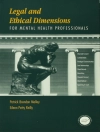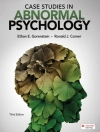How can philosophy guide our understanding of and approach to counseling ethics and techniques? Moving beyond the standard review of ethical issues and basic problem solving, this highly engaging new text for counseling professionals features innovative, experiential activities and case studies that promote in-depth thinking about the ethical, moral, and legal issues often confronted by counseling professionals. The book is designed to help counselors develop an appreciation for and confidence in their preferred set of philosophical ethics and become ethically autonomous professionals. To this end, it examines a full range of philosophical approaches to ethics, such as the well-known concepts of ethics codes and laws, as well as the less familiar ideas of existential phenomenology, care ethics, and virtues.
Featuring contributions from leading counselor educators and practitioners representing a wide range of expertise in counseling specialties and ethical practice, this text presents ethical practice from a positive, proactive point of view rather than from a reactive or fear-based stance. It provides a solid foundation in ethical decision making, critical thinking, and best practices that will enable counseling professionals to navigate the maze of ethical codes and standards of care, while confidently practicing in a consistently ethical manner. The accompanying Instructorís Manual offers step-by-step guidance on how to facilitate classroom activities and case study discussions, as well as a sample syllabus and a selection of quiz and essay questions to enhance studentsí understanding of each chapter. The text is congruent with relevant ethical codes and CACREP curriculum standards.
Key Features:- Provides activity-based learning regarding all the ethical standards and legal issues counselors will face
- Promotes in-depth critical thinking and a proactive, postitive approach to ethical and moral dilemmas
- Includes examples across all counseling settings and specialties
- Offers students multiple case examples that make ethical issues realistic and engaging
- Features Instructorís Manual offering sample syllabus and resources for course activities
Tabla de materias
Preface
Acknowledgement
Contributors Introduction
I. Philosophical Context
1. Philosophy and Counselor Ethics
2. An Existential Approach to Making Sense of Counselor Identity
3. Ethical Decision Making
4. Getting off track in Ethical Practice
II. Best Practices with Ethical Standards
5. Spiritual and Personal Values and Cultural Sensitivity
6. Boundary Issues in Counselor Ethics
7. Legal and Ethical Considerations for Confidentiality
8. Record Keeping and Technology in Counseling
9. Practitioner Self-Care and Issues of Transition
10. Assessment and Research Ethics
11. Ethics in Counseling Supervision and Consultation
III. Ethics in Counseling Practice
12. Ethics in Couples and Family Counseling
13. Ethics in Addictions Counseling
14. Ethics in Career Counseling
15. Ethics in School Counseling
16. Ethics in Group Counseling
17. Ethics in Community-based Counseling Contexts
Sobre el autor
Jocelyn Gregoir, CSSP, Ed D, LPC, NCC, ACS, is a Roman Catholic priest who has been involved in the counseling field for many years. He is an assistant professor in the Department of Counseling, Psychology, and Special Education at Duquesne University in Pittsburgh, Pennsylvania.












